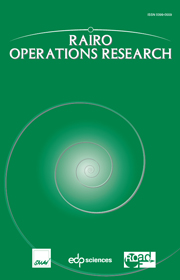Article contents
Wage bargaining with discount rates varying in time under different strike decisions∗
Published online by Cambridge University Press: 21 March 2014
Abstract
We present a non-cooperative union-firm wage bargaining model in which the union must choose between strike and holdout if a proposed wage contract is rejected. The innovative element that our model brings to the existing literature on wage bargaining concerns the parties’ preferences which are not expressed by constant discount rates, but by sequences of discount factors varying in time. First, we determine subgame perfect equilibria if the strike decision of the union is exogenous. We analyze the case when the union is committed to strike in each disagreement period, the case when the union is committed to strike only when its own offer is rejected, and the case of the never strike exogenous decision. A comparison of the results is provided, among the cases of the exogenous strike decisions. Next, we consider the general model with no assumption on the commitment to strike. We find subgame perfect equilibria in which the strategies supporting the equilibria in the exogenous cases are combined with the minimum-wage strategies, provided that the firm is not less patient than the union. If the firm is more impatient than the union, then the firm is better off by playing the no-concession strategy. We find a subgame perfect equilibrium for this case.
- Type
- Research Article
- Information
- Copyright
- © EDP Sciences, ROADEF, SMAI, 2014
References
- 2
- Cited by




